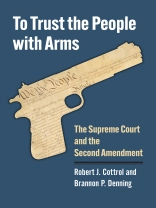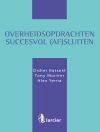In 2007, for the first time in nearly seventy years, the Supreme Court decided to hear a case involving the Second Amendment. The resulting decision in District of Columbia v. Heller (2008) was the first time the Court declared a firearms restriction to be unconstitutional on the basis of the Second Amendment. It was followed two years later by a similar decision in Mc Donald v. City of Chicago, and in 2022, the Court further expanded its support for Second Amendment rights in New York State Rifle and Pistol Association v. Bruen—a decision whose far-reaching implications are still being unraveled. To Trust the People with Arms explores the remarkable and complex legal history of how the right to bear arms was widely accepted during the nation’s founding, was near extinction in the late twentieth century, and is now experiencing a rebirth in the Supreme Court in the twenty-first century.
Robert J. Cottrol and Brannon P. Denning link the right to bear arms with other major themes in American history. Prompted by the eighteenth-century belief that arms played a vital role in preserving the liberties of the citizen, the Second Amendment met many challenges in the nation’s history. Among the most acute of these were racism, racial violence, and the extension of the right to bear arms to African Americans and other marginalized groups. The development of modern firearms and twentieth-century urbanization also challenged traditional notions concerning the value of an armed population. Cottrol and Denning make a particularly important contribution linking the nation’s participation in the wars of the twentieth century and the strengthening of the American gun culture. Most of all, they give us a nuanced and sophisticated legal history, one that engages legal realism, different varieties of originalism, and the role of chance and accident in history. To Trust the People with Arms integrates history, politics, and law in an interdisciplinary way to illustrate the roles that guns and the right to keep and bear arms have played in American history, culture, and law.
Innehållsförteckning
Acknowledgments
Introduction
1. Constitutional Predicates
2. “Negro Laborers, ” “Low-Browed Foreigners, ” and the “Efficiency of a Well-Regulated Militia”
3. Arms, War, and law in the American Century
4. From Causal Acceptance to Virtual Desuetude
5. Shifting Tides
6. One Case, Many Controversies
7. A Silence Broken
8. Mc Donald
9. Bruen, An Unanticipated Epilogue
Notes
Bibliographic Essay
Index
Om författaren
Robert J. Cottrol is Harold Paul Green Research Professor of Law and professor of history and sociology at George Washington University. He is the author of The Long, Lingering Shadow: Slavery, Race, and Law in the American Hemisphere and coauthor of Brown v. Board of Education: Caste, Culture, and the Constitution.Brannon P. Denning is Starnes Professor of Law at Cumberland School of Law at Samford University. He is the author of The Glannon Guide to Constitutional Law: Powers and Liberties and the coauthor of American Constitutional Law: Powers and Liberties and Guns and the Law: Cases, Problems, and Explanation.












